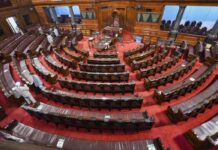X: @the_news_21
Assam Chief Minister Himanta Biswa Sarma issued a stern warning to All India United Democratic Front (AIUDF) chief Badruddin Ajmal, cautioning against the continuation of ‘magical healing’ practices and threatening legal action if found in violation of the law. The directive comes in the wake of the Assam assembly’s recent passage of the Assam Healing (Prevention of Evil) Practices Bill, 2024, aimed at curbing non-scientific healing modalities within the state.
The legislation, which received legislative approval last month, seeks to foster awareness among the populace regarding scientifically sound healing methodologies, safeguarding human health against purportedly malevolent practices thriving on misinformation and societal vulnerabilities. The Bill specifically targets non-scientific healing practices allegedly exploited for ulterior motives, posing a threat to public health and well-being.
Members of the AIUDF have raised objections, highlighting their party chief’s role as a spiritual leader who attracts voluntary seekers of healing. Ajmal, known for his spiritual influence, is frequently sought out by Muslims for ritualistic practices such as blowing into water bottles, believed to imbue the water with healing properties.
Chief Minister Sarma minced no words in his warning to Ajmal, asserting that any continuation of healing practices would result in legal consequences. “If he (Badruddin Ajmal) will do healing practices, he will be arrested. What I will say, will happen. I am not speaking about myself, I am speaking about the Assembly,” Sarma declared emphatically.
Refuting the notion of personal discretion, Sarma underscored the collective mandate of the Assembly, emphasizing the legislative prohibition on healing practices. “You don’t listen to Himanta Biswa Sarma’s words, but you will have to listen to what the Assembly is saying. The assembly has stopped the healing practices,” he reiterated.
Under the provisions of the Bill, offenses related to non-scientific healing practices are deemed cognizable and non-bailable. A first-time offender may face imprisonment for up to one year, extendable to three years, along with a fine of ₹50,000, or both. Subsequent convictions carry steeper penalties, including imprisonment for up to five years, a fine of ₹1 lakh, or both, signaling the gravity of the legislature’s stance on the matter.








how to get cheap clomiphene without prescription clomid prices in south africa can i buy clomiphene get generic clomiphene without insurance get cheap clomid pills cost of generic clomiphene pills cheap clomiphene online
This website really has all of the tidings and facts I needed about this participant and didn’t identify who to ask.
order generic zithromax – buy generic tinidazole 300mg flagyl 400mg cost
order augmentin generic – https://atbioinfo.com/ purchase ampicillin generic
buy meloxicam for sale – https://moboxsin.com/ meloxicam 15mg tablet
buy diflucan generic – flucoan order fluconazole 200mg pill
buy generic cenforce – cost cenforce 100mg cenforce without prescription
cialis for sale over the counter – ciltad gn buy cheapest cialis
cialis online no prior prescription – https://strongtadafl.com/# cialis canada
zantac 150mg over the counter – aranitidine zantac 150mg over the counter
The thoroughness in this draft is noteworthy. https://buyfastonl.com/gabapentin.html
This is a theme which is in to my verve… Many thanks! Faithfully where can I notice the connection details in the course of questions? https://gnolvade.com/es/fildena/
I’ll certainly return to review more. https://ursxdol.com/get-cialis-professional/
More articles like this would make the blogosphere richer. https://prohnrg.com/product/rosuvastatin-for-sale/
More posts like this would bring about the blogosphere more useful. aranitidine
Thanks on putting this up. It’s okay done. https://ondactone.com/spironolactone/
This is the tolerant of delivery I recoup helpful.
imitrex 50mg usa
I’ll certainly bring back to be familiar with more. http://furiouslyeclectic.com/forum/member.php?action=profile&uid=24634
dapagliflozin online buy – https://janozin.com/ dapagliflozin 10 mg generic
buy orlistat generic – https://asacostat.com/# buy orlistat pills
Thanks towards putting this up. It’s okay done. http://seafishzone.com/home.php?mod=space&uid=2331485
I am in truth delighted to glitter at this blog posts which consists of tons of of use facts, thanks object of providing such data. cialis en belgique
This website positively has all of the bumf and facts I needed to this participant and didn’t know who to ask.
kuwin sở hữu kho game đa dạng từ slot đến trò chơi bài đổi thưởng, mang đến cho bạn những giây phút giải trí tuyệt vời.
采用高效谷歌站群策略,快速提升网站在搜索引擎中的可见性与权重。谷歌站群
kuwin sở hữu kho game đa dạng từ slot đến trò chơi bài đổi thưởng, mang đến cho bạn những giây phút giải trí tuyệt vời.
Khám phá thế giới giải trí trực tuyến đỉnh cao tại MM88, nơi mang đến những trải nghiệm cá cược thể thao và casino sống động.
Dive into the atmosphere of luxury and excitement. In crown coin casino login, popular slots from leading providers are available. Boost your bankroll with bonuses!
The reels of Sweet Bonanza never sleep — tumbles lead to more tumbles, multipliers lead to fortunes. Free spins sweet bonanza 21100x are the cherry on top. Get your sweet fix!
Stampede toward glory with every thrilling spin. bull and games delivers sunset scatters, unlimited free games, and gold collection jackpots for endless rewards. Play today!
Experience the thrill of casino wins without spending a cent. chumba slots free Sweeps Coins welcome bonus lets you play and win real cash prizes. Start now!
Crash, Tower, Limbo, Plinko — stake casino bonus Originals keep players coming back every day. Try them free first.
DraftKings casino West Virginia Casino brings Vegas to you. Wager $5 for 500 bonus spins and enjoy up to $1,000 in credits covering losses. Premium action awaits!